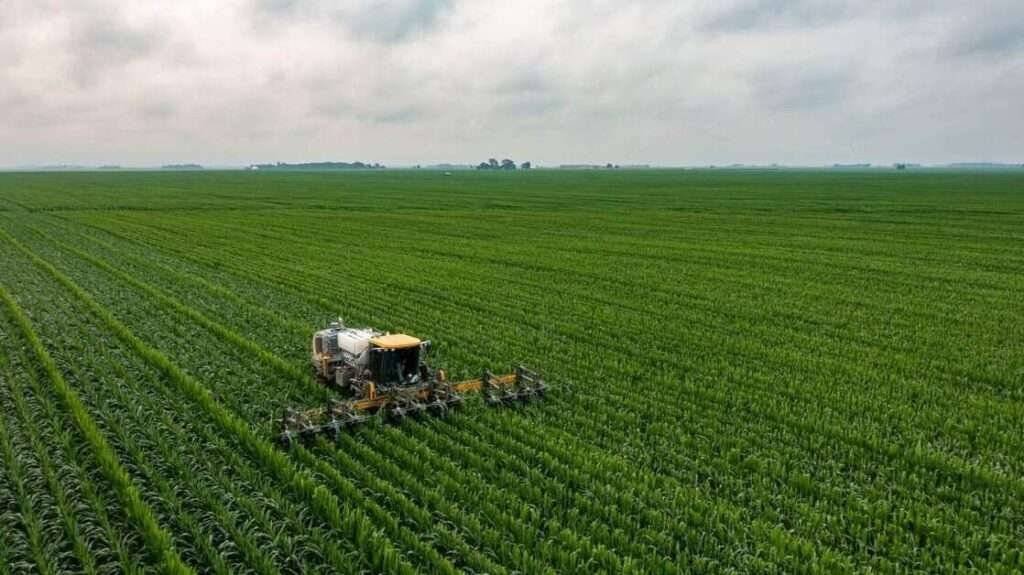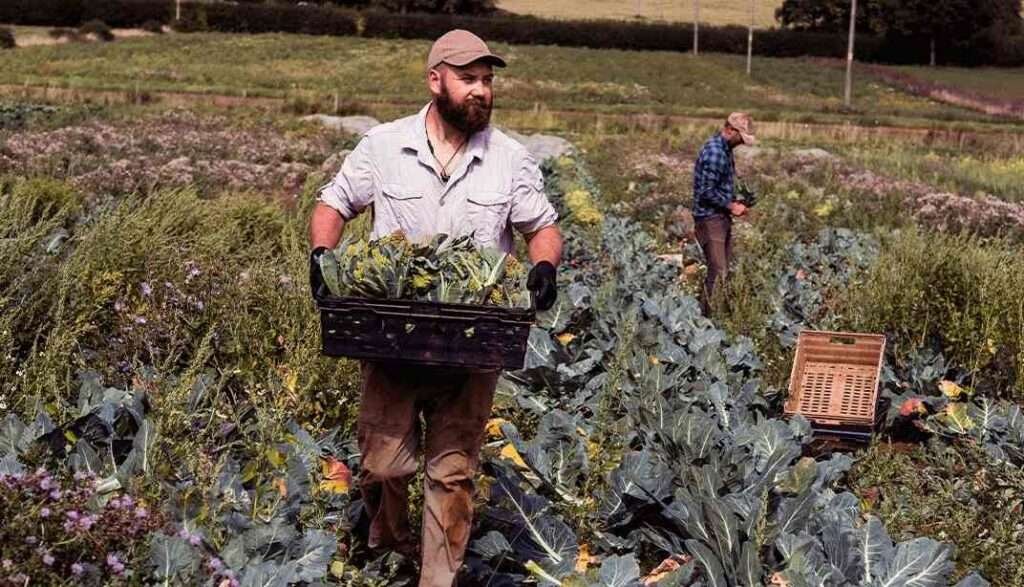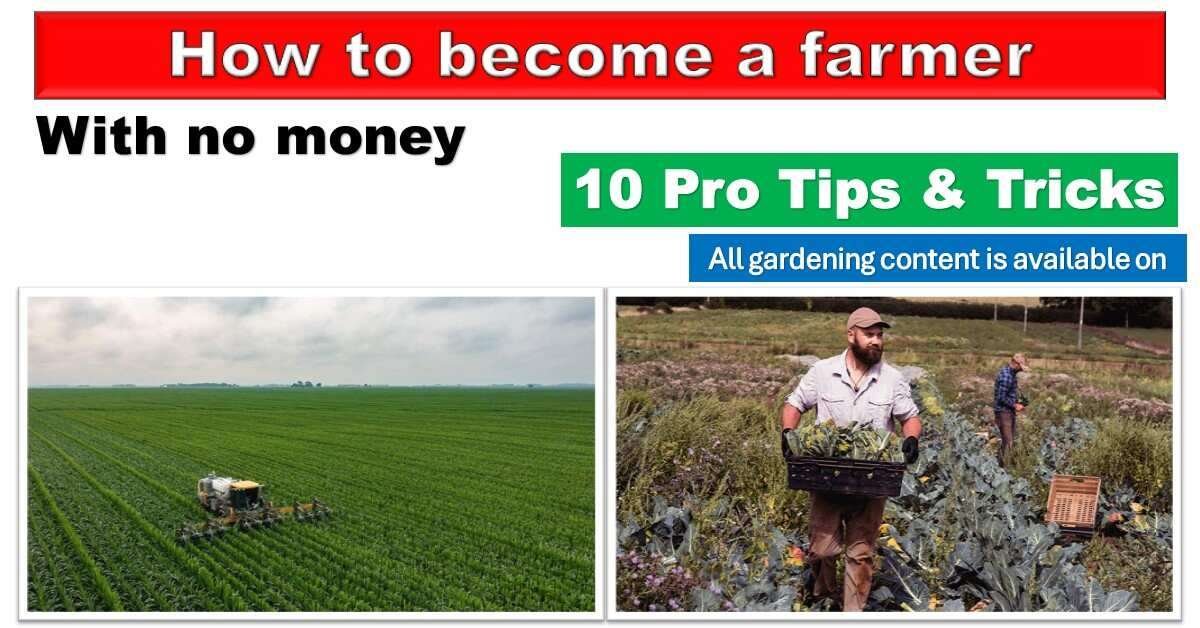What you will read in this Blog?
ToggleThis guide will discuss how to Become a Farmer with no money and contains Pro tips about low-investment farming. If you follow these steps, you can become a farmer with no money.
Who is a Passionate Farmer?
A passionate farmer is someone who embodies a deep dedication to the art and science of agriculture. They are not just someone who works the land or tends to crops. Their lifelong passion for nourishing the soil and promoting life transcends the confines of time and seasons.
A solid love for the environment and its people is at the centre of their being. They know the details of the natural environment, planting and harvesting time frames, and soil health. For them, farming embodies a career and a way of life steeped in history and constantly changing due to new advancements.

Ardent farmers are distinguished by their constant desire for perfection. Their motivation stems from their insatiable curiosity, the ongoing search for novel approaches, and the adoption of eco-friendly methods. They are constantly looking to improve, not only for themselves but also for the benefit of society as a whole. Examples of this include experimenting with organic agricultural techniques and utilizing technology.
Introduction
The desire to become a farmer can seem unattainable when local farming and sustainable living are growing more popular, particularly for low-income individuals. The idea that farming requires a significant initial investment is only partial. Even with limited financial resources, passionate farmers may cultivate success with imagination, perseverance, and an ability to learn. This tutorial will examine practical methods and approaches for beginning a farm on a shoestring budget.
Why to Become a Successful Farmer?
A prosperous farmer has an enormous effect outside of the fields they work, making them the unsung heroes of our society. Here’s a quick summary of the crucial benefits they offer:
Food Security: They stabilize availability and pricing by guaranteeing a consistent supply of nutrient-dense vegetables.
Economic Prosperity: Farmers create jobs and expand markets, stimulating economic growth.
Environmental Conservation: By adopting sustainable techniques, they lessen the ecological damage caused by agriculture.
Rural development: Farmers support rural areas by investing in healthcare, education, and infrastructure.
Leading the way in agricultural innovation, they disseminate best practices and insights.
Health & Well-Being: They encourage healthy lifestyles by producing wholesome, fresh foods.
Farmers’ achievements go beyond farming; they influence our society’s structure and guarantee a sustainable future.
How to Become a Farmer with no money

Begin Small, Imagine Big
Evaluate your resources and available space first. Starting a farm can be a manageable amount of land. You can begin in any space—a tiny backyard, empty urban lot, or community garden plot.
Make Use of Community Resources
Use neighbourhood resources like cooperative extension initiatives, farmer’s markets, and agricultural extension agencies. These groups frequently offer aspiring farmers insightful training, networking opportunities, and information. Participate in workshops, seminars, and farm visits to get knowledge from seasoned producers and connect with like-minded people who can provide guidance and encouragement. This guide will discuss how to become a farmer with no money.
Make use of land leases or land-sharing agreements.

If you don’t own any land, consider getting into a land-sharing or land-lease arrangement with nearby landowners. For a little price or a share of the crop, many landowners are willing to lease or share their property with would-be farmers. Seek out chances to work together with landowners who hold underutilized or unused property that has the potential to be profitable agricultural. This guide will discuss how to become a farmer with no money.
Adopt Sustainable Agricultural Methods

Sustainable agricultural methods help farmers save money on inputs and improve the environment. Examine methods like agroforestry, permaculture, and organic farming that emphasize increasing output while reducing the need for artificial inputs. CreateBy implementing sustainable methods, you can create healthy soil, preserve water, and lessen your need for pricey inputs like pesticides and fertilizers. This guide will discuss how to become a farmer with no money.
Use Your Funding Creatively
There are other ways to finance your farming endeavour, even though typical financial choices might be less plentiful. Consider grants, micro-loans, and crowdfunding initiatives designed especially for small-scale farmers. This guide will discuss how to become a farmer with no money.
Adopt Sustainable Agricultural Methods
Sustainable agricultural methods help farmers save money on inputs and improve the environment. Examine methods like agroforestry, permaculture, and organic farming that emphasize increasing output while reducing the need for artificial inputs. CreateBy implementing sustainable methods, you can create healthy soil, preserve water, and lessen your need for pricey inputs like pesticides and fertilizers. This guide will discuss how to become a farmer with no money.
Use Your Funding Creatively
There are other ways to finance your farming endeavour, even though typical financial choices might be less plentiful. Consider grants, micro-loans, and crowdfunding initiatives designed especially for small-scale farmers. This guide will discuss how to become a farmer with no money.
Spread Out Your Sources of Income
To diversify your money streams, look into alternative income-generating ventures in addition to growing crops. Think about selling value-added items like pickles, jams, and baked goods produced with the food from your farm. Consider agritourism activities like farm tours, workshops, or farm-to-table dinners to draw guests and make extra money. You can lessen your reliance on any one revenue source and create a more sustainable farm business by diversifying your sources of income. This guide will discuss how to become a farmer with no money.
Create Connections with the Community and Customers
Develop trusting connections with your clients and the locals to create a network of devoted patrons and supporters for your farm. Engage in conversations with potential customers by showcasing your products at local farmer’s markets, community events, and culinary festivals. Regularly provide customers with fresh, locally farmed produce by offering farm-to-table delivery services or CSA (Community Supported Agriculture) subscriptions. Building relationships with your clients and the local community may develop long-term success and a sustainable market for your farm products. This guide will discuss how to become a farmer with no money.
Never Give Up on Adapting and Learning
Since farming is a dynamic and ever-changing industry, learning new things and adjusting to new circumstances is critical. Keep up with the latest innovations in agriculture, cutting-edge technology, and environmentally friendly farming methods. Seek opportunities to improve your knowledge and abilities as a farmer through continued education, training, and mentoring. Be willing to try new things and modify your strategy in response to advice and experience. Even with few financial means, you may overcome obstacles and succeed as a farmer if you maintain curiosity, adaptability, and resilience.
Summary:
Introduction: Though starting a farming endeavour on a tight budget may seem impossible, it is feasible with careful planning and ingenuity. This guide will examine doable strategies to assist would-be farmers in overcoming financial obstacles and building success from the ground up. This guide will discuss how to become a farmer with no money.
Start Small: To start, focus on high-demand crops in a small-scale enterprise. Learn as you develop and progressively widen.
Utilize the Resources at Your Disposal:
- Lease property.
- Become a member of cooperatives.
- Look to agricultural organizations for mentorship and instructional materials.
Embrace Sustainability: Implement sustainable techniques like organic farming to cut expenses and draw in eco-aware customers.
Be Innovative in Your Financing Approaches: Examine grants, micro-loans, and crowdsourcing. For resources and equipment, think about joint ventures or trading.
Maximize Efficiency:
- Make the best use of available resources.
- Apply labour-saving methods.
- Build infrastructure with inexpensive materials.
Develop Value-Added Activities and Niche Markets to Supplement Primary Crop Production and Boost Profitability. Diversify Your Income Streams.
Remain Resilient: It takes perseverance, patience, and a readiness to change. Recognize that obstacles are a necessary element of the road to success in agriculture.
In conclusion, launching a farming business on a shoestring budget is possible with perseverance and inventiveness. Aspiring farmers can build successful agricultural companies and fulfil their farming aspirations by utilizing the available resources, embracing sustainability, and encouraging collaborations.
Some Careers in Farming
For those passionate about sustainability, creativity, and caring for the land, there are a variety of fulfilling careers available in today’s agricultural environment. Let’s examine a few of the top careers today in farming:
Agripreneurship: Using startups and business endeavours to encourage agricultural innovation.
Experts in precision agriculture: maximizing yields with data analytics and technology.
Agronomists: Utilizing scientific concepts to achieve maximum crop yields.
Advocates for Sustainable Farming: Supporting environmentally sustainable methods for a strong future.
Urban farmers: Growing food in urban areas to combat food insecurity.
Agriculture Educators: The role of agricultural educators is to motivate the upcoming generation of agricultural stewards.
These fields combine creativity and tradition, science and sustainability, and passion and purpose. They also present professional development opportunities and help create a more just and resilient agricultural future.







